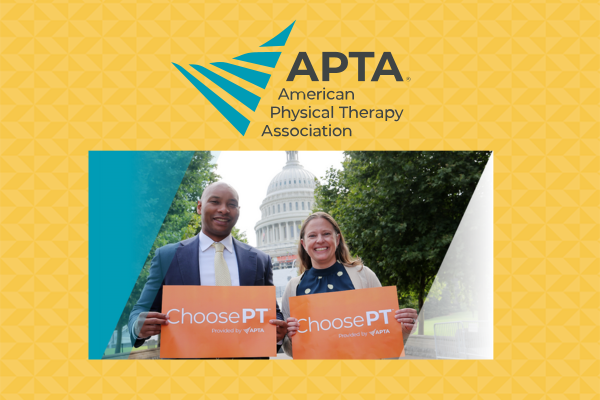APTA-Backed Legislation Beefs Up Falls Screening, Prevention by PTs in Medicare

The bipartisan House bill would explicitly refer to PT falls-related services in Medicare's "welcome" visit and annual wellness checks.
The physical therapy community has long understood that the best way to reduce the impact of fall-related injuries in older adults is to prevent them from happening in the first place. APTA has backed up that idea with an analysis that identifies the cost-benefit of fall prevention by a PT. Now, there are signals that the message may be getting through to Capitol Hill: An APTA-backed bipartisan bill has been introduced to boost fall screening and prevention among Medicare beneficiaries significantly.
Known as the Stopping Addiction and Falls for the Elderly Act, or SAFE Act (H.R. 7618), the legislation now in the U.S House of Representatives would make falls screening, including those conducted by PTs, a regular part of both the so-called "welcome to Medicare" visit, officially titled the Initial Preventive Physical Examination, and the Medicare Annual Wellness Visit. Reps introduced the bill. Carol Miller, R-W.Va., and Melanie Stansbury, D-N.M. APTA strongly supports the legislation.
The idea behind the SAFE Act is twofold: to reduce falls among older adults and, through that reduction, to decrease opioid use that often occurs after a fall injury. Specifically, the bill would ensure that beneficiaries identified by their physicians as having experienced a fall in the year before their Initial Preventive Physical Examination would be referred to a physical therapist for screening and preventive services. In addition, beneficiaries who've been enrolled in Medicare for at least a year and who choose to participate in an annual wellness visit (different from an annual physical) would be referred for a separate falls risk assessment and potential additional PT services if the yearly wellness visit reveals that they've fallen within the previous year.
The SAFE Act aligns with APTA’s ongoing public policy priorities of expanding health benefits under federal programs, such as Medicare, to include coverage for preventive and wellness services provided by physical therapists to help reduce downstream costs. This priority legislation will be part of APTA’s Capitol Hill Day on April 15-16 in Washington, DC.
The legislation is also consistent with findings from an APTA report that identified cost savings associated with seeing a PT first or early on for eight common conditions, with falls included in that list. The report "The Economic Value of Physical Therapy in the United States" concluded that seeing a PT for fall prevention services was associated with a net cost benefit of approximately $2,100 per episode of care, primarily due to the hospital admissions and emergency department visits that could be avoided.
"[The report] shows the cost-effectiveness of physical therapist services for fall prevention and emphasizes the need for improved access to them," said APTA President Roger Herr, PT, MPA, in an APTA news release. "By helping to reduce the risk of falls, this legislation will improve the lives of Medicare beneficiaries and provide cost-savings. The American Physical Therapy Association applauds the leadership of Reps. Miller and Stansbury on this important issue."